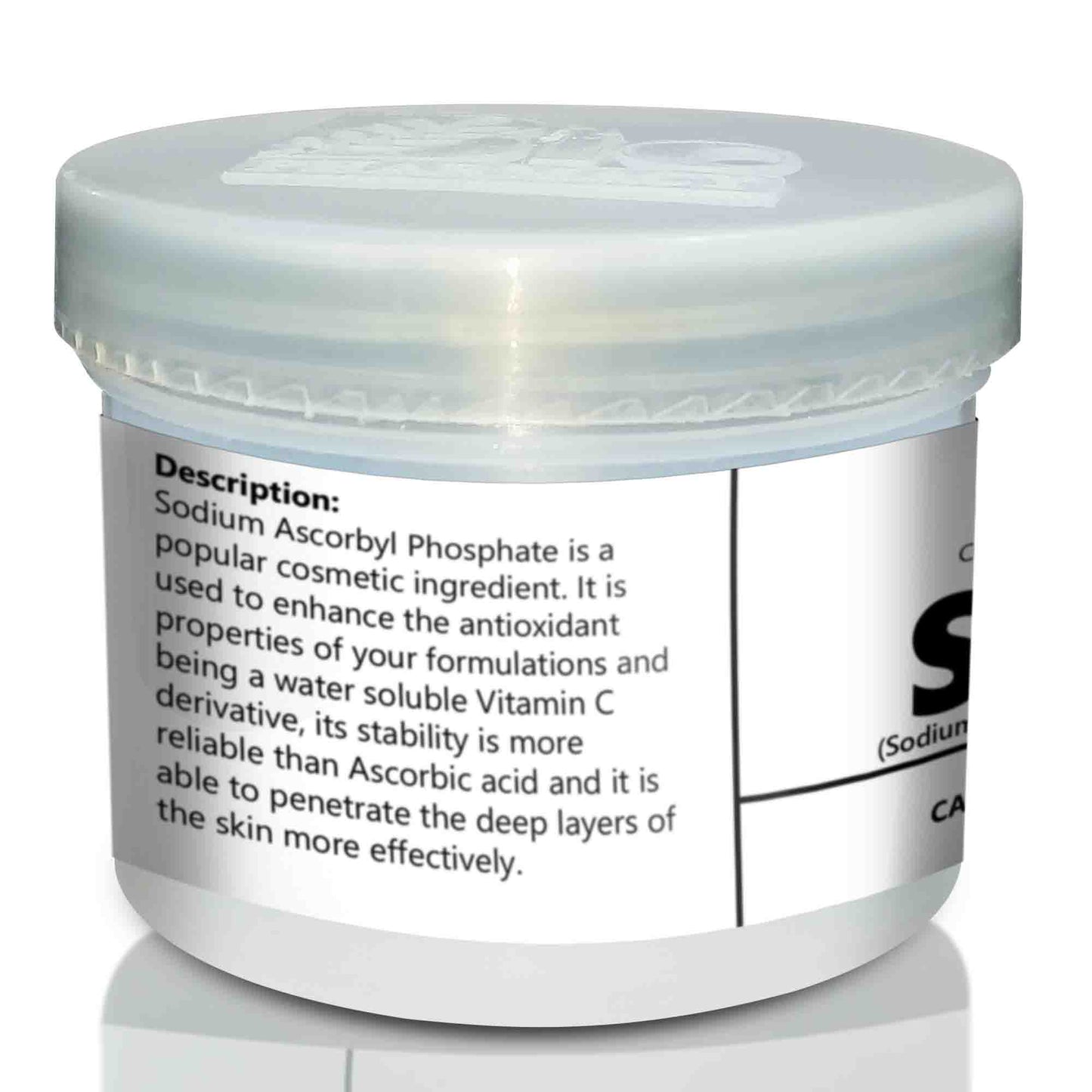Bio Shop
SAP (Sodium Ascorbyl Phosphate)
SAP (Sodium Ascorbyl Phosphate)
Key Functions: Acts as a stable, water-soluble antioxidant and skin brightener, ideal for acne-prone and dull skin.
Couldn't load pickup availability



Explore
Information About SAP (Sodium Ascorbyl Phosphate)
✅ Key Features
- Stable derivative of Vitamin C suitable for water-based formulas
- Brightens skin tone and fades hyperpigmentation
- Antioxidant protection against environmental stress
- Reduces acne bacteria and inflammation
- Non-irritating, ideal for sensitive skin types
🔬 Description
Sodium Ascorbyl Phosphate (SAP) – Stable Vitamin C Derivative for Brighter Skin
Sodium Ascorbyl Phosphate (SAP) is a water-soluble form of Vitamin C known for its excellent stability and gentle performance. Unlike L-Ascorbic Acid, SAP is non-irritating and does not oxidize quickly, making it perfect for daily use in serums, lotions, toners, and gels. It helps brighten dull skin, fade dark spots, and control acne by reducing bacterial growth. SAP also works as an antioxidant, fighting free radicals and supporting collagen synthesis. Suitable for all skin types, especially oily, acne-prone, or sensitive skin.
📊 Technical Data
INCI Name: Sodium Ascorbyl Phosphate
CAS Number: 66170-10-3
Solubility: Soluble in water
Add Phase: Cool-down or warm water phase (below 40°C)
pH Stability: 6.0 – 7.5 (optimal efficacy around pH 6.5)
Processing Temperature: Below 40°C
Appearance: White to off-white powder
Odor: Mild to odorless
Molecular Formula: C6H6Na3O9P
Molecular Weight: 322.04 g/mol
Flash Point: Not flammable
Density: ~1.9 g/cm³
Chemical Type: Vitamin C derivative (phosphate ester)
Functional Groups: Phosphate, enediol
Primary Cosmetic Uses: Skin brightening, antioxidant, anti-acne, collagen support
🧪 Recommended Usage
- Usage Rate: 1% – 5%
- Phase: Add to water phase below 40°C
- Ideal For: Brightening Serums, Acne Gels, Day Creams, Anti-aging Toners, Spot Treatments
💡 Pro Tip
🌟 Combine SAP with niacinamide or alpha arbutin for amplified brightening. Avoid using it in low pH (acidic) formulas to maintain full activity. Ideal pH is around 6.5 for best results.
👩🔬 Skin Type Compatibility
✔️ Ideal for all skin types
✔️ Excellent for oily, acne-prone, and sensitive skin
✔️ Safe for daily use in AM and PM routines
🧴 Formulation Ideas
1. Brightening Serum (Daily Use)
Use 3% SAP with hyaluronic acid and panthenol for a lightweight, non-irritating glow booster.
2. Acne Control Gel
Formulate with 2% SAP, 1% niacinamide, and zinc PCA for sebum balancing and antibacterial action.
3. Day Cream with Vitamin C
Add 1–2% SAP into a moisturizing cream with SPF for antioxidant protection.
4. pH-balanced Toner
Incorporate 2% SAP into an aloe-based toner for dull, tired skin.
5. Dark Spot Treatment
Create a targeted roll-on gel with 5% SAP, licorice extract, and alpha arbutin.
💧 Cosmetic Suitability:
Serums
⭐⭐⭐⭐⭐ – Excellent
🟩🟩🟩🟩🟩 – Powerful antioxidant and brightening action.
Creams & Lotions
⭐⭐⭐⭐☆ – Good
🟩🟩🟩🟩⬜ – Enhances skin tone and texture.
Toners
⭐⭐⭐⭐☆ – Good
🟩🟩🟩🟩⬜ – Brightening and soothing in lightweight water systems.
Face Masks
⭐⭐⭐⭐☆ – Good
🟩🟩🟩🟩⬜ – Works in gel or sheet masks for radiance.
Cleansers
⭐⭐⭐☆☆ – Moderate
🟧🟧🟧⬜⬜ – Minimal benefit due to rinse-off.
Hair Masks
⭐☆☆☆☆ – Poor
🟥⬜⬜⬜⬜ – Not a typical application.
Deodorants
⭐☆☆☆☆ – Poor
🟥⬜⬜⬜⬜ – Not relevant for odor control.
Eye Creams
⭐⭐⭐⭐☆ – Good
🟩🟩🟩🟩⬜ – Brightens under-eye area safely.
Shampoos
⭐☆☆☆☆ – Poor
🟥⬜⬜⬜⬜ – Not used in hair cleansers.
Soaps
⭐☆☆☆☆ – Poor
🟥⬜⬜⬜⬜ – Not suitable for high pH soap systems.
Conditioners
⭐☆☆☆☆ – Poor
🟥⬜⬜⬜⬜ – Not applicable.
Lip Balms
⭐☆☆☆☆ – Poor
🟥⬜⬜⬜⬜ – Not water-compatible.
Body Butters
⭐☆☆☆☆ – Poor
🟥⬜⬜⬜⬜ – Not recommended for anhydrous formulas.
Ointments
⭐☆☆☆☆ – Poor
🟥⬜⬜⬜⬜ – Not suitable for oil-based treatments.
❓ FAQs
Q1: How is SAP different from L-Ascorbic Acid?
A1: SAP is more stable, less irritating, and better for oily or sensitive skin.
Q2: Can I use it during the day?
A2: Yes — it’s stable in light and safe for AM use, especially under SPF.
Q3: Is SAP good for acne-prone skin?
A3: Yes — it inhibits acne-causing bacteria and reduces inflammation.
Q4: Will it brighten my skin tone?
A4: Yes — it helps fade pigmentation, dullness, and dark spots with regular use.
Q5: What should I avoid combining with SAP?
A5: Avoid low-pH acids like AHAs or pure Vitamin C (L-AA) in the same formula.
📂 Documentation
Upon request, we will provide.
Where Can You Safely Use SAP (Sodium Ascorbyl Phosphate)
Discover how SAP (Sodium Ascorbyl Phosphate) performs across different products — rated for safety, stability, and effectiveness.




